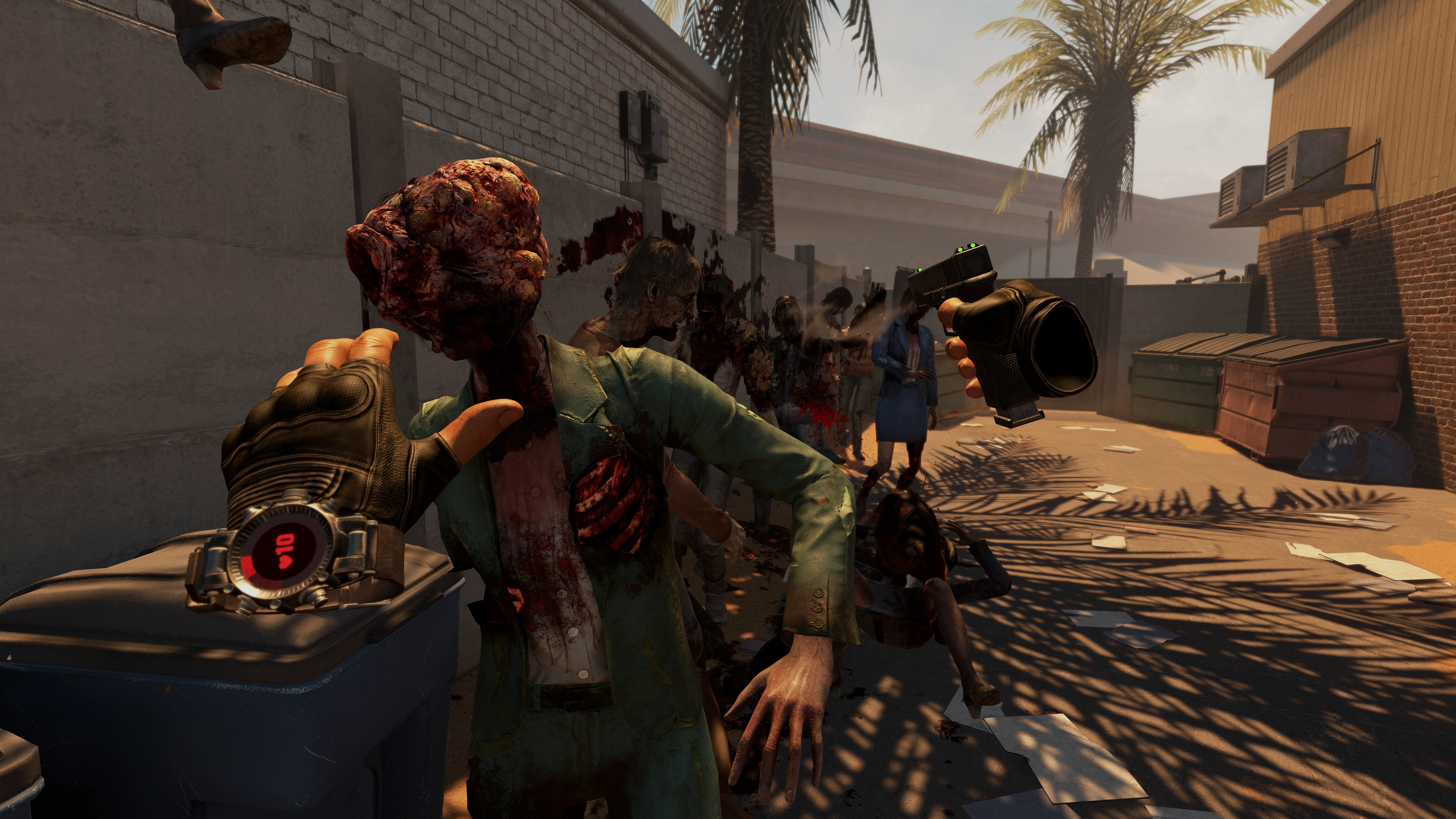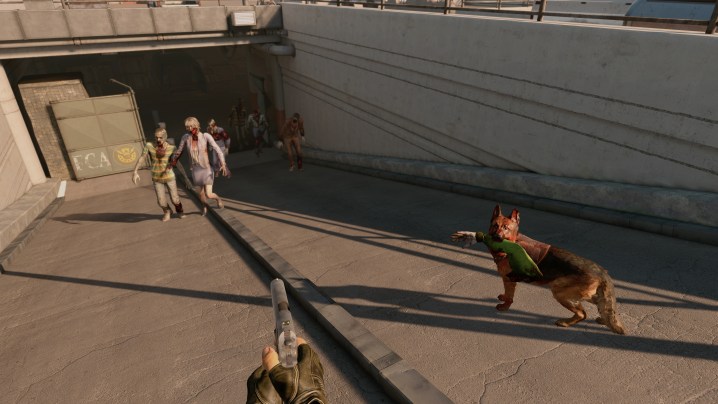
[ad_1]

Arizona Sunshine 2
MSRP $60.00
“Arizona Sunshine 2’s technical problems prevent an otherwise solid zombie VR shooter from reaching its full potential.”
Pros
- Thrilling campaign set pieces
- Smart VR control and level design
- Fun horde mode
Cons
- Annoying protagonist
- Frame rate drops and glitches
- Frequent crashes
In one of Arizona Sunshine 2‘s most thrilling set pieces, I had to reach the front of a moving train as it headed toward a collapsed bridge. I tensely picked off zombies in each train car, getting a physical workout as I had to climb on the side of a car. Interspersed between those moments of intensity, I felt a surge of power as I used a minigun that could chew through all the zombies rushing toward me and a flamethrower that let me burn the undead to a crisp. During this sequence, all of Arizona Sunshine 2‘s best gameplay systems sang loudly, and it being in virtual reality only heightened my immersion in what was happening.
That exhilarating experience came to a screeching halt, not when the train hit the bridge, but when the game crashed after I completed the level.
That tension defines Arizona Sunshine 2, a wildly fun VR a zombie shooter fighting back hordes of technical issues. Between visual glitches and frequent game crashes, Vertigo Games’ latest is a exciting action experience that you might want to hold off on until it’s clean enough to keep the train barreling down the tracks.
Gravely unfunny
Arizona Sunshine 2 puts players in the virtual reality shoes of a gruff, unnamed survivor living on his own in the postapocalyptic world. He’s gone mad on his own and talks to zombies like they’re a singular being named Fred. His dull survival gets a lot more interesting when a helicopter crashes, he finds a dog in the wreckage, and he is directed to bring the pooch to other surviving humans. It’s a relatively run-of-the-mill postapocalyptic story about a man finding friendship in an unlikely place after the end of the world. It’s unfortunate that it never clicked with me because of how irksome the survivor is.

Sky Soleil hams it up and puts in a charismatic performance, but everything that comes out of this character’s mouth is woefully lame. That seems intentional on the developer’s part as they want to show how deprived of interaction the survivor is, but it was repellant rather than irritatingly charming, like this type of character archetype can be in postapocalyptic media like The Last Man on Earth. Despite the story’s attempts in its last few levels, he never graduates into being understandably unlikeable.
Part of what makes virtual reality games appealing is that they can immerse you as a character in a world. While I see potential in having a playable VR character that’s more fleshed out and well-written, I was peeved whenever Arizona Sunshine 2 tried to do that. Anytime he’d say something like he “gives good head” when I got a headshot or waxed poetic about where dog scrotums go after they are neutered, I got the urge to just throw myself into the horde of zombies and take the headset off.
Masters of VR
Thankfully, Vertigo Games VR shooter gameplay is refined enough to make up for some eye-rolling writing. The best compliment I can give Arizona Sunshine 2 is that it just feels right to play. I’ve played several VR shooters since picking up my PSVR2 headset, and it feels like each game has its own take on how gameplay elements like moving, climbing, holding weapons, and reloading should work. Vertigo Games made the correct control decisions on almost all of those fronts.
Sliding movement feels as fluid as with a console shooter and never left me feeling sick (a teleportation-based control scheme and lots of toggleable movement and accessibility modifiers are present for more nauseous players). Climbing is a simple button press and pull, like in Snyapse, which makes for some refreshing traversal between hectic fights. I could holster three weapons on my body and two on my dog, so I always had access to the right gun I needed for a situation. As someone who’s obese, I also appreciate how I can adjust the width and height of holstered weapons and ammo to something that feels much more comfortable to play.

Less smooth is weapon reloading, which turns into a juggling act as I try to correctly slot bullets into my gun on the fly. There’s a reason console shooters have boiled down this action to one button press: It’s just less fun to be fumbling with a clip in the middle of a fight. Still, I commend Arizona Sunshine 2 for properly highlighting which parts of the weapon I needed to interact with to reload it so this process could go smoother and for letting me command the dog to attack a zombie if I needed to create some space between myself and an enemy to reload.
I stuck with the pistols for most of the campaign because they’re the easiest to reload. And once I was able to start shooting, I found that there’s something inherently gratifying about seeing a zombie’s head pop off in VR that Arizona Sunshine 2 bolsters with its crunchy, detailed audio design. The agme leans more into the action game genre and survival horror, as there weren’t many moments where I found myself scouring the environments desperately for ammo or constantly switching weapons to preserve different ammo types.
The campaign’s level design and the Horde mode also reflect this action-centric approach. Levels are linear and full of memorable set pieces. One had me fighting off zombies at a concert venue by setting off the pyrotechnics in front of the stage. The campaign brings me back to Xbox 360 and PS3 shooters, which is a good indication of where VR game design is right now relative to the broader game industry. The gameplay systems harmonize more freely in horde mode, a simple wave-based affair that emphasizes the best parts of Arizona Sunshine 2’s gameplay, even if it’s not nearly as complex as something like Call of Duty’s Zombies modes.
A technical mess
All of those positive elements start to cement Arizona Sunshine 2 as one of the best new AAA experiences on PlayStation VR2. Unfortunately, at least ahead of release, it’s a technical mess. During my time with the campaign, visual glitches were frequent. That was especially so in moments where two objects interacted in a weird way, like a door wildly spasming in the air as a bunch of zombies approached it on the other side.
My floor height would change at random sometimes too, making me a short king in the postapocalyptic world. The frame rate would also routinely drop to unacceptable levels, especially when I was using my flamethrower. It became a particular issue during the concert set piece, as performance slowed to a crawl, making what should’ve been one of the game’s most thrilling moments uncomfortable.

Even more concerning was how much Arizona Sunshine 2 crashed. During my playtime, it crashed on me six times, with two of those being after a mid-review period patch. While these crashes never caused me to lose any progress, that’s the most I’ve encountered playing a game this year outside of The Lord of the Rings: Gollum. Oftentimes, it happened to me at the end of a level. There’s something darkly humorous about the fact that almost every time I thought it might be time to wrap my VR session up, Arizona Sunshine 2 would unceremoniously crash on me at the end of the level I played or when I died. That’s definitely funnier than most of the jokes that came out of its hero’s mouth.
Despite Vertigo Games’ mastery of many aspects of VR game design, those technical issues and other small frustrations stack up and make it difficult to fully recommend Arizona Sunshine 2 at present. Whenever I thought I might have found my new favorite VR game, a dumb wisecrack or crash would quickly change my mind. In a more polished state, I would recommend PSVR2 or Meta Quest 3 owners looking for new big-budget experiences tocheck Arizona Sunshine 2 out. As it stands, this train feels like it has not yet fully arrived at the station.
Arizona Sunshine 2 was tested on PlayStation VR2.
Editors’ Recommendations
[ad_2]